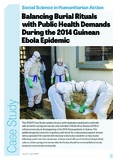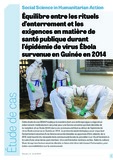Balancing Burial Rituals with Public Health Demands During the 2014 Guinean Ebola Epidemic
Équilibre entre les rituels d’enterrement et les exigences en matière de santé publique Durant l’épidémie de virus Ébola survenue en Guinée en 2014
| dc.contributor.author | Anoko, Julienne | |
| dc.contributor.author | Henry, Doug | |
| dc.coverage.spatial | Guinea | en |
| dc.date.accessioned | 2020-06-16T09:10:04Z | |
| dc.date.available | 2020-06-16T09:10:04Z | |
| dc.date.issued | 2020-06-16 | |
| dc.identifier.citation | Anoko, J. and Henry, D. (2020) Balancing Burial Rituals with Public Health Demands During the 2014 Guinean Ebola Epidemic, SSHAP Case Study Issue 8, UNICEF, IDS and Anthrologica. | en |
| dc.identifier.citation | Anoko, J. et Henry, D. (2020) Équilibre entre les rituels d’enterrement et les exigences en matière de santé publique Durant l’épidémie de virus Ébola survenue en Guinée en 2014, Étude de cas SSHAP Numéro 8, UNICEF, IDS et Anthrologica | fr |
| dc.identifier.uri | https://opendocs.ids.ac.uk/opendocs/handle/20.500.12413/15419 | |
| dc.description.abstract | This SSHAP Case Study explains how an anthropologist negotiated a medically safe burial for a pregnant woman who had died of Ebola Virus Disease (EVD) in a Kissi community at the beginning of the 2014 Ebola epidemic in Guinea. The epidemiological protocol to organise a safe burial for a deceased pregnant woman with suspected EVD clashed with the local community’s need for a ritual burial following a post-mortem caesarean. A tense stand-off occurred. According to Kissi culture, when a pregnant woman dies the foetus should be removed before burial, to avoid a curse on the community. | en |
| dc.description.abstract | Cette étude de cas SSHAP explique la manière dont une anthropologue a négocié un enterrement médicalement sécurisé pour une femme enceinte qui était décédée de la maladie à virus Ébola (MVE) dans une communauté Kissi au début de l’épidémie de virus Ébola survenue en Guinée en 2014. Le protocole épidémiologique pour organiser l’enterrement sécurisé d’une femme enceinte décédée soupçonnée d’être atteinte de la MVE s’est heurté à la nécessité de la communauté locale de procéder à un rituel funéraire à la suite d’une césarienne post-mortem. Une confrontation tendue a eu lieu. Selon la culture Kissi, lorsqu’une femme enceinte décède, le foetus doit être retiré avant l’inhumation, pour éviter une malédiction sur la communauté. | fr |
| dc.description.sponsorship | UNICEF | en |
| dc.description.sponsorship | USAID | en |
| dc.language.iso | en | en |
| dc.publisher | SSHAP | en |
| dc.relation.ispartofseries | SSHAP Case Studies;Issue 8 | |
| dc.rights.uri | http://creativecommons.org/licenses/by/4.0/ | en |
| dc.subject | Health | en |
| dc.title | Balancing Burial Rituals with Public Health Demands During the 2014 Guinean Ebola Epidemic | en |
| dc.title | Équilibre entre les rituels d’enterrement et les exigences en matière de santé publique Durant l’épidémie de virus Ébola survenue en Guinée en 2014 | fr |
| dc.type | Series paper (non-IDS) | en |
| dc.rights.holder | SSHAP | en |
| dc.identifier.externaluri | https://www.socialscienceinaction.org/ | en |
| rioxxterms.funder | Default funder | en |
| rioxxterms.identifier.project | Default project | en |
| rioxxterms.version | NA | en |
| rioxxterms.funder.project | 9ce4e4dc-26e9-4d78-96e9-15e4dcac0642 | en |



